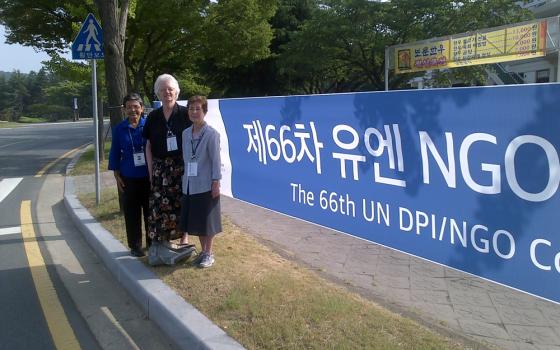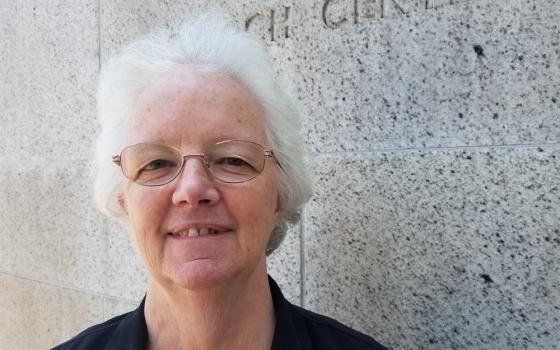What does it mean to be a global citizen?
Women religious and others grappled with that question during a recent United Nations conference in South Korea on education and global citizenship.
The May 30-June 1 event in Gyeongju, South Korea, focused on the theme of "Education for Global Citizenship: Achieving the Sustainable Development Goals Together."
U.N. member states have agreed to 17 Sustainable Development Goals to reduce poverty and promote a sustainable environment through the year 2030. Reaching those goals will mean educating people about the need for global education, say two attendees at the event in South Korea: Sr. Eileen Reilly, director of the School Sisters of Notre Dame's U.N. office, and Sr. Winifred Doherty, the U.N. representative of the Congregation of Our Lady of Charity of the Good Shepherd.
GSR caught up with Reilly and Doherty in New York following the conference to assess what it means to be a global citizen and how education, long a vocation for Catholic sisters, can help efforts to increase global awareness.
GSR: Why is the theme of global citizenship important, particularly in these times?
Reilly: Because the serious issues in our 21st-century world are not contained by national boundaries, our responses to these issues cannot stop at our borders. Responses to the worldwide migration crisis, to the calls to mitigate climate change, and, yes, even to the U.S. elections will depend on the depth of our commitment to global citizenship.
In any news cycle, our attention is grabbed by items with which we have a connection. True global citizens have a connection with all of it. I share citizenship with the refugee who died fleeing Syria. I share citizenship with those whose land and homes are destroyed by fracking.
Doherty: Global citizenship is more important than ever to adequately address climate change, to enhance implementation of the Sustainable Development Goals and work toward peace and security for people and planet. The concept of 'global citizenship' is not just for the 'ordinary people' of the world, but to build relationships across nations, replacing power and dominance with ethical principles in all areas, particularly in trade, finance, business and economy — replacing greed and profit with equality and a people-centered agenda.
What is the best way to connect local and global issues through education?
Reilly: The old adage to 'think globally and act locally' is no longer sufficient. A new word is slowly emerging to describe our attempts to connect local and global issues. That word is 'glocally.'
We as educators act 'glocally' when we connect the individual water consumption patterns of our students to a deeper understanding for them of the problems of water scarcity and how they might respond. When a school in Guam heard about the water crisis in Papua New Guinea, their response was immediate and generous. The presence of reminders in their own school keeps them connected.
Doherty: Human rights are human rights and need to be taught through educational processes — formal and informal at the local and national level, at all levels. The new consciousness of the rights of Mother Earth need to be published, implemented and upheld. The Universal Declaration of Human Rights is an international declaration but needs to be explored, taught and implemented at the local level. Analyzing the local context in the light of the universal declaration is one way to connect local and global. Equally important is taking specific, concrete actions at the local level on respecting Mother Earth that contribute to the global well-being of all.
What did the conference do to better connect these different levels of local and global?
Reilly: Through a series of workshops, many were able to showcase best practices. Additionally, for many, this was a first opportunity to participate in an international conference: Over 80 countries were represented. The pace of the conference seemed to be designed to promote informal contacts, also.
Goal 4 of the Sustainable Development Goals, the goal on education and lifelong learning, was central to our time together, though the subtitle for the conference was 'achieving the SDGs together.' That broader context helped build connections, also. Education (Goal 4) was highlighted as the best tool to eradicate poverty (Goal 1). Eliminating corruption (Goal 16) is essential if the structures needed for quality education (Goal 4) are to be put in place.
Doherty: The engagement of large numbers of youth at the conference was heartening. Their hope, enthusiasm, commitment and desire to be active global citizens was evidenced in their commitment to, as a youth declaration at the meeting put it, 'building strong intergenerational partnerships with those around us; offering honest, measured and unbiased perspectives to policy and decision making processes, for the betterment of all, not just for young people; striving to leave this planet better than we found it.'
The amplification of their voice and their desire to take their responsibility for the world community was a very tangible way of connecting local with global. They are working and advocating for the implementation of the SDGs, including their networks, online platforms and social media.
There was tension between local perceptions and government policies and perceptions. There was also tension over some global issues like gender equality and sexual orientation that are still seen as Western attitudes being imposed on local cultures.
What spiritual insights did you have about the conference and the theme?
Reilly: Our [congregation's] constitution, 'You Are Sent,' calls us and challenges us to 'make one.' The phrase from the conference's theme — 'global citizenship' — brings a 21st-century way to think about that challenge. Now more than ever, we don't need to leave our hometown for opportunities to exercise our global citizenship, to 'make one.'
Doherty: There were numerous affirmations and commitments that were not expressly spiritual yet undergird what we do: in the realm of education, respecting local specificities, including the political, social, cultural and historical dimensions. Beyond that, how do we address gender equality in a patriarchal society? How to challenge ideas that are different? How do we open our minds and hearts to another perspective? How can we be respectful in listening? How can we engage in expressing one's point of view but not using bullying tactics? How to teach the 'mighty' about exploitation of the Earth and patriarchal mindsets and yet keeping in mind that the Magnificat reads, 'God casts down the mighty from their thrones and lifts up the lowly'?
How strong was the sisters' presence at the event?
Reilly: In his opening remarks, Secretary General Ban Ki-moon suggested that 'NGO' not only stands for 'nongovernmental organization,' but also for 'networks of global opportunities.' And this is what this conference was for me: three wonderful days of networking. A casual mention of our New York-based Working Group on Girls at a workshop on girls' rights brought about many informal conversations about WGG: what we do, how to join, when was the International Day of the Girl, etc.
In addition, the SSNDs who came with me from Guam and Japan connected me with those in their networks, and my colleagues who came from New York connected me to the colleagues from their organizations. I left with a pack of business cards and many promises to send more information and stay in touch.
Doherty: Different congregations did not have a coordinated plan leaving New York. I was centered on having local workshops on Sustainable Development Goals with our sisters in South Korea and creating awareness of the fact that the Korean government is making a presentation during the U.N.'s high-level political forum in July, then accompanying three of the sisters to the conference.
Good Shepherd contributed significantly toward the Gyeongju Action Plan by placing 'gender equality' and 'spirituality' into the document. How could one think of education for global citizenship and not have a gender equality component?
As for spirituality: When introduced, it was seen as integral to holistic development and the development of global citizenship. The Gyeongju Action Plan ended up saying, 'Education must advance the cause of global citizenship which promotes integrated development of the whole person emotionally, ethically, intellectually, physically, socially, and spiritually; imbued with an understanding of our roles, rights and responsibilities for the common good in service to humanity and the advancement of a culture of peace, non-violence, freedom, justice, and equality.'
[Chris Herlinger is GSR's international correspondent. His email address is [email protected].]



